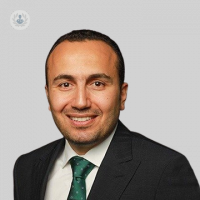TMS treatment for anxiety: What is it, and how is it used?
Written in association with:Transcranial magnetic stimulation (TMS) is a non-invasive procedure that uses magnetic fields to stimulate nerve cells in the brain. It’s been increasingly recognised as a potential treatment for various mental health conditions, including anxiety disorders.
In this article, highly respected consultant psychiatrist Dr Mohamed Abdelgani takes an in-depth look at the use of TMS in the treatment of anxiety and addresses some common questions patients may have about this therapy.

What is Transcranial Magnetic Stimulation (TMS)?
TMS involves the use of a magnetic coil placed against the scalp to deliver targeted magnetic pulses to specific areas of the brain.
These magnetic pulses stimulate nerve cells in the brain, regulating brain activity and potentially alleviating symptoms of anxiety.
What’s involved in a TMS session?
During a TMS session, the patient sits in a comfortable chair while the magnetic coil is placed on the scalp.
The coil delivers repetitive magnetic pulses to the targeted area of the brain, typically the prefrontal cortex, for a duration of about 20 to 30 minutes per session.
TMS is usually administered daily over several weeks, with the total number of sessions determined by the treating physician based on individual response and symptom severity.
Who qualifies for TMS anxiety treatment?
TMS for anxiety is typically considered for individuals who have not responded adequately to traditional treatments such as medication and therapy.
Candidates for TMS undergo a comprehensive evaluation by a psychiatrist or mental health professional to determine the appropriateness of the treatment for their specific condition.
What are the benefits of TMS for anxiety?
Non-invasive
TMS is a non-invasive procedure that does not require anaesthesia or sedation, making it well-tolerated by most patients.
Unlike some medications, TMS does not have systemic side effects, such as weight gain or sexual dysfunction.
Improvement in symptoms
Clinical studies have shown that TMS can be effective in reducing symptoms of anxiety, including excessive worry, fear, and nervousness.
Many patients experience significant improvement in their anxiety symptoms following a course of TMS treatment.
What are the risks of TMS for anxiety?
Common side effects
The most common side effects of TMS are mild and transient and may include:
- Headache;
- scalp discomfort, and;
- mild tingling or twitching sensations during treatment.
These side effects typically resolve shortly after the completion of a TMS session.
Severe side effects
While rare, TMS may be associated with more serious side effects, such as seizures, particularly in individuals with a history of epilepsy or other seizure disorders.
Patients undergoing TMS are closely monitored for any adverse reactions, and treatment can be adjusted or discontinued if necessary.
What should people thinking about having TMS for anxiety consider before going ahead?
Transcranial magnetic stimulation (TMS) offers a promising alternative for individuals with anxiety disorders who have not responded to conventional treatments. With its non-invasive nature, minimal side effects, and potential efficacy, TMS represents a valuable addition to the treatment options available for anxiety. However, as with any medical procedure, it’s essential for patients to discuss the risks, benefits, and alternatives of TMS with their healthcare provider to determine the most appropriate course of action for their individual needs.
If you’d like to see whether TMS is right for treating your anxiety, arrange a consultation via her Top Doctors profile.


